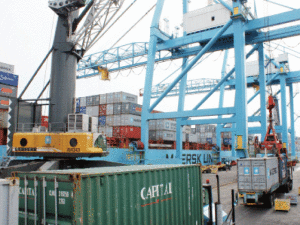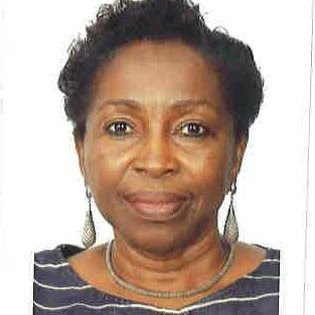Dr West Idahosa, a former Chairman, House Ad-hoc Committee on Maritime Security,
on Friday called for a review of Nigeria’s maritime policies for the benefit of
indigenous operators.
Idahosa made the call in an interview with the News Agency of Nigeria
(NAN) in Lagos.
on Friday called for a review of Nigeria’s maritime policies for the benefit of
indigenous operators.
Idahosa made the call in an interview with the News Agency of Nigeria
(NAN) in Lagos.
He said maritime policies, especially the Cabotage Act, must be
evaluated based on three critical factors of national capabilities,
availability of qualified manpower and global best practices.
evaluated based on three critical factors of national capabilities,
availability of qualified manpower and global best practices.
According to Idahosa it is important to know what has happened to
indigenous participants’ capacity to compete with global competitors since the
Cabotage law was enacted.
indigenous participants’ capacity to compete with global competitors since the
Cabotage law was enacted.
“We must find out the percentage growth to the degree of
participation by indigenous ship owners in the sector since the passage of the
Cabotage law,’’ he said.
participation by indigenous ship owners in the sector since the passage of the
Cabotage law,’’ he said.
Idahosa said the international nature of the maritime, made it
imperative to operate on the same level with the rest of the world with
necessary infrastructure.
imperative to operate on the same level with the rest of the world with
necessary infrastructure.
“I know the Cabotage law was largely meant to promote growth of
indigenous entrepreneurship and give a sense of economic support to those who
have invested in such a major sector of the economy.
indigenous entrepreneurship and give a sense of economic support to those who
have invested in such a major sector of the economy.
“I do not think the advantage can come, given the fact that Nigeria
does not have, to the best of my knowledge, more than one or two shipyards.
does not have, to the best of my knowledge, more than one or two shipyards.
“I know that Nigerdock is there and a few dockyards around to
possibly do minor and pedestrian ship repairs.
possibly do minor and pedestrian ship repairs.
“But I think that when it comes to major assemblage of ships, you
have to defer to America, China, Germany, South Korea, even Singapore,’’
Idahosa said.
have to defer to America, China, Germany, South Korea, even Singapore,’’
Idahosa said.
He said that since the Cabotage law was meant to promote
Nigerian-owned vessels, it was important to define the ownership being referred
to.
Nigerian-owned vessels, it was important to define the ownership being referred
to.
“Is it ownership by presence? Is it ownership commercially by
purchase? Is it ownership by assemblage? Is it ownership by flagging? These are
the various issues,’’ Idahosa said.
purchase? Is it ownership by assemblage? Is it ownership by flagging? These are
the various issues,’’ Idahosa said.
He suggested that the Cabotage law be reviewed in order to make
adjustments and align with time to avoid operational difficulties.
adjustments and align with time to avoid operational difficulties.
Idahosa suggested more private sector initiatives in realisation of
the objectives of the Cabotage law.
the objectives of the Cabotage law.
Dr West Idahosa, a former Chairman, House Ad-hoc Committee on Maritime Security,
on Friday called for a review of Nigeria’s maritime policies for the benefit of
indigenous operators.
Idahosa made the call in an interview with the News Agency of Nigeria
(NAN) in Lagos.
on Friday called for a review of Nigeria’s maritime policies for the benefit of
indigenous operators.
Idahosa made the call in an interview with the News Agency of Nigeria
(NAN) in Lagos.
He said maritime policies, especially the Cabotage Act, must be
evaluated based on three critical factors of national capabilities,
availability of qualified manpower and global best practices.
evaluated based on three critical factors of national capabilities,
availability of qualified manpower and global best practices.
According to Idahosa it is important to know what has happened to
indigenous participants’ capacity to compete with global competitors since the
Cabotage law was enacted.
indigenous participants’ capacity to compete with global competitors since the
Cabotage law was enacted.
“We must find out the percentage growth to the degree of
participation by indigenous ship owners in the sector since the passage of the
Cabotage law,’’ he said.
participation by indigenous ship owners in the sector since the passage of the
Cabotage law,’’ he said.
Idahosa said the international nature of the maritime, made it
imperative to operate on the same level with the rest of the world with
necessary infrastructure.
imperative to operate on the same level with the rest of the world with
necessary infrastructure.
“I know the Cabotage law was largely meant to promote growth of
indigenous entrepreneurship and give a sense of economic support to those who
have invested in such a major sector of the economy.
indigenous entrepreneurship and give a sense of economic support to those who
have invested in such a major sector of the economy.
“I do not think the advantage can come, given the fact that Nigeria
does not have, to the best of my knowledge, more than one or two shipyards.
does not have, to the best of my knowledge, more than one or two shipyards.
“I know that Nigerdock is there and a few dockyards around to
possibly do minor and pedestrian ship repairs.
possibly do minor and pedestrian ship repairs.
“But I think that when it comes to major assemblage of ships, you
have to defer to America, China, Germany, South Korea, even Singapore,’’
Idahosa said.
have to defer to America, China, Germany, South Korea, even Singapore,’’
Idahosa said.
He said that since the Cabotage law was meant to promote
Nigerian-owned vessels, it was important to define the ownership being referred
to.
Nigerian-owned vessels, it was important to define the ownership being referred
to.
“Is it ownership by presence? Is it ownership commercially by
purchase? Is it ownership by assemblage? Is it ownership by flagging? These are
the various issues,’’ Idahosa said.
purchase? Is it ownership by assemblage? Is it ownership by flagging? These are
the various issues,’’ Idahosa said.
He suggested that the Cabotage law be reviewed in order to make
adjustments and align with time to avoid operational difficulties.
adjustments and align with time to avoid operational difficulties.
Idahosa suggested more private sector initiatives in realisation of
the objectives of the Cabotage law.
the objectives of the Cabotage law.


































































